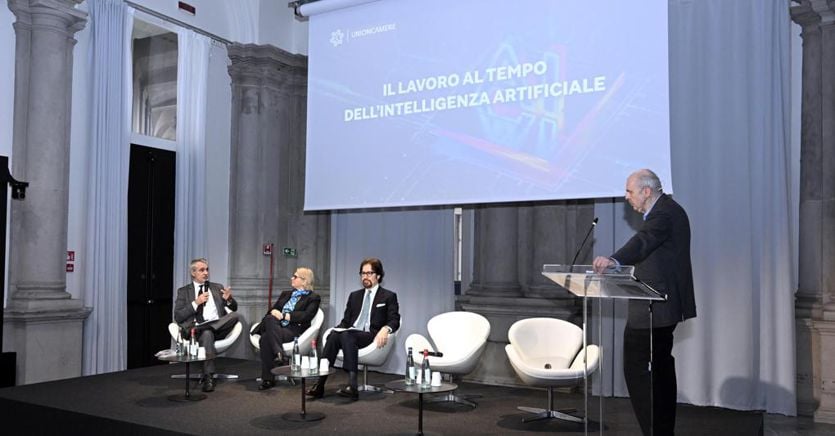Listen to the audio version of the article
The search for talent and the retraining of staff, the development of new skills and the management of new organizational models: bringing AI into the heart of companies is an all-round challenge that goes well beyond the purely technological aspect. The conference “Work in the time of Artificial Intelligence”, organized by Sole 24 Ore and Unioncamere and held yesterday in Milan at Palazzo Giureconsulti (and followed by around a thousand people), was dedicated to the analysis of the changes to which companies are called to manage the implementation of algorithm technologies. The starting point is an unequivocal fact: demographic decline and lack of adequate training have dropped Italy to 69th place, out of 133 countries, in terms of ease of finding professional figures with the required skills on the market. A scenario that generates concern and in which the Ai factor must be inserted, which according to Fabio Tamburini, director of Il Sole 24 Ore, is absolutely not a trend: «Among the many question marks on this technology, we have one certainty, and that is the fact that it will significantly impact everything, starting with our way of working, from offices to factories.” That AI is a strategic and central theme, and something more than a new great step in digital innovation, is convinced by Carlo Sangalli, president of the Chamber of Commerce of Milan, Lodi, Monza and Brianza, according to whom it is arriving in the field « a technology that opens up new scenarios for businesses in the field of data analysis and which requires, at the same time, continuous learning and regulation.” Barbara Caputo, professor in the Department of Automatic Control and Informatics at the Polytechnic of Turin, has focused in this sense on the ability to scale the training offer with respect to the (growing) demand for continuous updating dictated by AI. «The number of people interested in learning and reskilling paths – explained the teacher – is multiplying because the speed with which this subject evolves is enormous, and for this reason we need to adapt».
«Digital transformation and Ai will influence any sector and profession – observed in turn Fabio Vaccarono, CEO of Multiversity Group (which includes the digital universities Pegaso, Mercatorum and San Raffaele Roma) – and require a reconversion process that can only go through training, from systems of inclusion of skills and from advanced models of continuous learning”. The priority for overcoming the mismatch between job supply and demand, according to the manager, is twofold: on the one hand, involving millions of young graduates excluded from university studies and on the other, applying new technologies to education with conviction, bridging a gap of “dramatic” skills and exploiting AI to increase the productivity of the training course, optimizing the language and contents.
A significant leap forward, therefore, which requires synergies and unity of purpose between public and private and which cannot ignore, according to Stefano Scarpetta, director of Employment, Labor and Social Affairs at the OECD, two cornerstones: the AI governance and the valorization of human capital. «Today we are behind because change is moving fast, but it is necessary to give everyone the tools to make the best use of this technology by nurturing, developing and maintaining a fundamental quality which is the critical spirit of the person». How much impact AI will have on employment dynamics will be seen later: a recent OECD survey on a sample of 2 thousand companies that have already adopted it says that there is no direct consequence on employment levels, on the contrary. In many cases technology is considered a complement to the profession and an “add on” that improves productivity and the quality of work. On the other hand, there is no doubt that many current tasks will change and that a fair portion of jobs may be replaced by generative algorithms. In short, generative artificial intelligence will help create enhanced professions and project those with intermediate skills towards higher level roles, but it must not ignore its ethical component.
